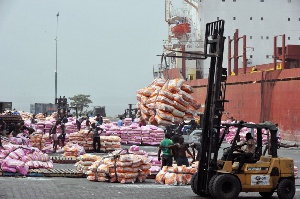The Member of Parliament for Kintampo North Constituency, Mr. Etu Bonde has described the importation of foodstuffs from other countries into the country as shameful.
The Member of the Committee on the Food and Agriculture Committee of Parliament wondered why Ghana that experiences favorable rainfall for crop production, would import from a country like Burkina Faso with an unfavorable rainfall.
According to him, Burkina Faso used irrigation as a strong tool for farming and that has paid off for them.
‘’It is shameful for Ghana to be importing tomatoes, onions from a desert. This is happening because we lack expertise, resources and skills in the agric sector. Irrigation is expensive but when you do it, you will generate more revenue.
It is also shameful for us to import rice when we have rice in this country. The way we even process the rice in this country is also a challenge we need to address.’’
Ghana currently spends about US$600m annually to import rice. The country spends an additional US$400m annually to import sugar, tomatoes, vegetable cooking oil, frozen fish, poultry and wheat.
Former President John Dramani, as part of efforts to reduce importation of rice said his administration was targeting a reduction in the US$1b imports of food by developing the local capacity to produce more of them.
President Nana Addo Dankwa Akufo-Addo has also indicated that his administration will reduce the importation of food into the country following the launch of the One-District One-Warehouse initiative at Ejura in the Ashanti Region.
President Akufo-Addo revealed that the objective of the Warehouse initiative was to increase production of staples like maize by 30 per cent, rice by 25 per cent, sorghum by 28 per cent and soya bean by 25 per cent.
The programme forms part of the larger component of government’s Infrastructure for Poverty Eradication Programme (IPEP).
According to the President, the government will ensure the warehouses are equipped with modern equipment including drying and freezing systems.
The warehouse program will see to the construction of a 1000 metric tonnes capacity warehouse in each of the 216 districts across the country.
Business News of Saturday, 2 December 2017
Source: rainbowradioonline.com













